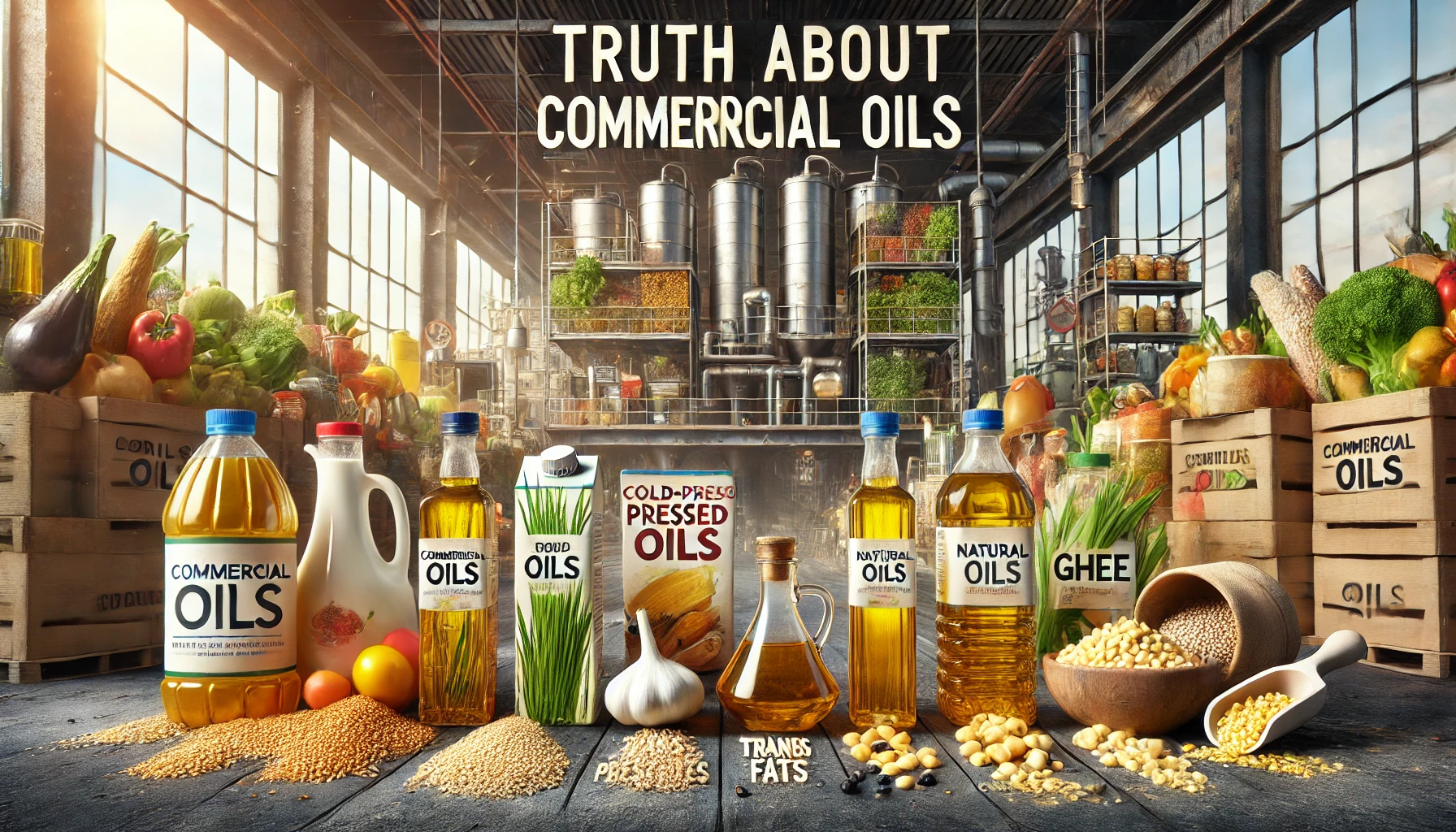- You have no items in your shopping cart
- Subtotal: ₹0.00

The Truth About Commercial Oils: Why Cold-Pressed Is Superior
Cold-Pressed Oils vs. Refined Oils: In today’s health-conscious world, dietary fats and oils play a significant role in determining the quality of our overall health. However, with numerous varieties of cooking oils available in the market, it can be challenging to decide which is healthier. The two main types of oils that often draw comparisons are cold-pressed oils and commercially refined oils. While both types serve the purpose of cooking and flavoring food, they differ significantly in terms of processing, nutritional value, and health benefits.
This article aims to explore the hidden truths behind commercially refined oils and reveal why cold-pressed oils are a superior choice for those seeking better health and wellness.
Understanding the Processing Methods: Cold-Pressed vs. Refined Oils
To understand why cold-pressed oils are superior to commercially refined oils, it is essential to first comprehend how both types of oils are produced.
Cold-Pressed Oils: The Natural Method
Cold-pressed oils are extracted from seeds, nuts, or fruits through a process known as cold pressing or wood pressing. This method involves crushing the raw materials at low temperatures (typically below 120°F/49°C) using a mechanical press or wooden churner, without the application of external heat or chemicals. The oil is then filtered to remove impurities, resulting in a pure, natural oil that retains its nutritional properties.
Key features of cold-pressed oil extraction:
- Low-temperature extraction: The absence of heat preserves the oil’s natural nutrients, enzymes, antioxidants, and essential fatty acids.
- No chemicals: No chemicals or solvents are used in the extraction process, ensuring the oil remains free of toxins.
- Minimal processing: Cold-pressed oils undergo minimal processing, making them as close to their natural state as possible.
Commercially Refined Oils: The Industrial Process
On the other hand, commercially refined oils are extracted through an industrial process that involves the application of heat, chemical solvents, and deodorization. The goal of refining is to increase the yield of oil and prolong its shelf life by removing impurities, but this comes at a significant cost to the oil’s nutritional quality.
The refining process typically includes the following steps:
- Extraction: Seeds or nuts are crushed, and the oil is extracted using high temperatures (often above 400°F/204°C) and solvents like hexane.
- Refining: The extracted oil is treated with chemicals like sodium hydroxide to remove free fatty acids and other impurities.
- Bleaching: The oil is bleached using clay to remove color and improve its appearance.
- Deodorization: The oil is heated to temperatures as high as 500°F (260°C) to remove any unwanted odors and flavors, further stripping the oil of its nutrients.
- Preservatives and additives: Finally, preservatives and additives are often added to increase the oil’s shelf life.
Key features of commercially refined oil extraction:
- High-temperature processing: The intense heat used during extraction and deodorization degrades essential nutrients and antioxidants.
- Chemical solvents: The use of chemical solvents like hexane can leave trace amounts of toxins in the oil.
- Refining and bleaching: These processes strip the oil of its natural color, flavor, and beneficial compounds.
Nutritional Differences Between Cold-Pressed vs. Refined Oils
One of the most significant differences between cold-pressed and refined oils lies in their nutritional content. The processing methods used to produce these oils have a profound impact on their nutritional value.
Cold-Pressed Oils: Nutritional Powerhouses
Cold-pressed oils retain all of the natural nutrients present in the seeds, nuts, or fruits from which they are extracted. These oils are rich in vitamins, antioxidants, and essential fatty acids that are crucial for maintaining good health.
Key nutrients in cold-pressed oils include:
- Vitamin E: A powerful antioxidant that helps protect cells from oxidative damage and supports skin health.
- Omega-3 and Omega-6 fatty acids: Essential fatty acids that play a vital role in heart health, brain function, and inflammation reduction.
- Phytonutrients and plant sterols: Compounds found in plants that have been shown to lower cholesterol levels and reduce the risk of heart disease.
- Natural flavor and aroma: Cold-pressed oils retain their natural flavors and aromas, which enhance the taste of food and make them ideal for dressings, drizzling, and low-heat cooking.
Refined Oils: Stripped of Nutrients
Commercially refined oils, on the other hand, are often stripped of their natural nutrients due to the high heat and chemical treatments used during the extraction process. While refined oils may still contain fats, they lack the essential vitamins, antioxidants, and beneficial compounds found in cold-pressed oils.
Key nutritional drawbacks of refined oils:
- Loss of antioxidants: High temperatures destroy antioxidants like Vitamin E, which are essential for protecting cells from oxidative damage.
- Depletion of essential fatty acids: The refining process can degrade the levels of Omega-3 and Omega-6 fatty acids, reducing the oil’s ability to support heart and brain health.
- Increased trans fats: Some refined oils may contain small amounts of trans fats, which are harmful to heart health and have been linked to an increased risk of cardiovascular disease.
- Empty calories: Refined oils are often referred to as “empty calories” because they provide energy in the form of fat but lack the nutritional benefits of cold-pressed oils.
Health Implications: Cold-Pressed Oils vs. Refined Oils
The nutritional differences between cold-pressed and refined oils translate into significant health implications. Choosing the right oil can have a profound impact on your long-term health and well-being.
Cold-Pressed Oils: A Healthier Choice
Cold-pressed oils offer a range of health benefits due to their rich nutrient content:
- Heart Health: Cold-pressed oils like cold-pressed olive oil, coconut oil, and flaxseed oil are rich in heart-healthy monounsaturated and polyunsaturated fats, as well as omega-3 fatty acids. These compounds help lower bad cholesterol (LDL) levels, reduce inflammation, and lower the risk of heart disease. A 2018 study published in the Journal of Clinical Lipidology showed that consuming cold-pressed oils rich in omega-3 fatty acids can significantly improve lipid profiles and reduce the risk of cardiovascular disease .
- Anti-Inflammatory Properties: Cold-pressed oils, particularly extra virgin olive oil and flaxseed oil, contain compounds like oleic acid and alpha-linolenic acid, which have potent anti-inflammatory effects. These oils can help reduce inflammation in the body, which is a major contributing factor to chronic diseases like arthritis, diabetes, and cancer. Research published in the American Journal of Clinical Nutrition has shown that diets rich in oleic acid can reduce markers of inflammation in the body .
- Rich in Antioxidants: Cold-pressed oils retain their natural antioxidants, such as Vitamin E and polyphenols, which help protect the body from oxidative stress and free radical damage. Antioxidants are essential for preventing cellular damage and reducing the risk of chronic diseases like cancer and neurodegenerative conditions. A study published in the Journal of the American College of Nutrition found that cold-pressed olive oil, in particular, is rich in polyphenols, which can reduce oxidative stress and improve overall health .
- Better for Skin and Hair: Cold-pressed oils like coconut oil and sesame oil are commonly used in skincare and haircare due to their moisturizing and nourishing properties. These oils are packed with essential fatty acids and antioxidants that promote healthy skin and hair. In contrast, refined oils lack these nutrients and may contribute to dryness and irritation when used topically.
- Improved Gut Health: Some cold-pressed oils, such as cold-pressed ghee and flaxseed oil, contain compounds that promote gut health by nourishing the gut lining and reducing inflammation. Cold-pressed ghee, in particular, contains butyrate, a short-chain fatty acid that supports the integrity of the gut lining and reduces symptoms of digestive disorders like irritable bowel syndrome (IBS) and inflammatory bowel disease (IBD).
Refined Oils: Health Risks
While refined oils are commonly used in households and restaurants due to their affordability and long shelf life, they come with several health risks:
- Increased Risk of Heart Disease: Refined oils, especially those high in omega-6 fatty acids, can promote inflammation and increase the risk of heart disease when consumed in excess. The overconsumption of omega-6 fatty acids relative to omega-3 fatty acids has been linked to a higher risk of cardiovascular disease, as highlighted in a study published in the American Journal of Cardiology .
- Trans Fats and Hydrogenation: Some refined oils, particularly partially hydrogenated oils, contain trans fats, which are among the most harmful fats for heart health. Trans fats raise bad cholesterol levels, lower good cholesterol levels, and increase the risk of heart disease and stroke. The World Health Organization (WHO) has called for the elimination of trans fats from the global food supply due to their detrimental health effects.
- Oxidative Stress and Inflammation: The refining process can produce harmful compounds like free radicals and aldehydes when oils are exposed to high temperatures. These compounds can cause oxidative stress and inflammation in the body, increasing the risk of chronic diseases such as cancer and diabetes. A 2019 study published in Food Chemistry found that heating refined oils at high temperatures increases the production of harmful oxidation products, which can contribute to oxidative stress .
- Nutrient Deficiency: As mentioned earlier, refined oils are stripped of their natural nutrients during processing, leaving behind “empty calories” that provide little to no health benefits. Over time, the consumption of nutrient-deficient oils can lead to deficiencies in essential fatty acids, vitamins, and antioxidants, which are critical for overall health.
Why Cold-Pressed Oils Are Superior
The comparison between cold-pressed oils and commercially refined oils clearly demonstrates that cold-pressed oils are a superior choice for health-conscious consumers. Here are some of the key reasons why cold-pressed oils are a better option:
- Retain Nutrients: Cold-pressed oils retain their natural nutrients, including vitamins, antioxidants, and essential fatty acids, which provide numerous health benefits.
- No Harmful Chemicals: Cold-pressed oils are free of harmful chemicals and solvents that are often used in the refining process of commercial oils.
- Rich in Antioxidants: Cold-pressed oils are packed with antioxidants that protect the body from oxidative stress and reduce the risk of chronic diseases.
- Lower Risk of Heart Disease: Cold-pressed oils contain heart-healthy fats that help lower cholesterol levels and reduce inflammation, reducing the risk of heart disease.
- Versatile and Flavorful: Cold-pressed oils retain their natural flavors and aromas, making them ideal for use in salad dressings, drizzling over dishes, and low-heat cooking.
Using GheeStore’s Cold-Pressed Oils
If you’re looking for high-quality cold-pressed oils to improve your health and elevate your cooking, look no further than GheeStore. We offer a range of cold-pressed oils, including cold-pressed sesame oil, cold-pressed groundnut oil, and cold-pressed coconut oil, all made using traditional methods that preserve their natural nutrients and flavors.
At GheeStore, we pride ourselves on providing our customers with the best quality oils that are free of chemicals, preservatives, and harmful additives. Our oils are perfect for cooking, skincare, and overall wellness.
Switch to GheeStore’s cold-pressed oils today and experience the difference in health, flavor, and quality!
Visit GheeStore to explore our range of cold-pressed oils and place your order.



